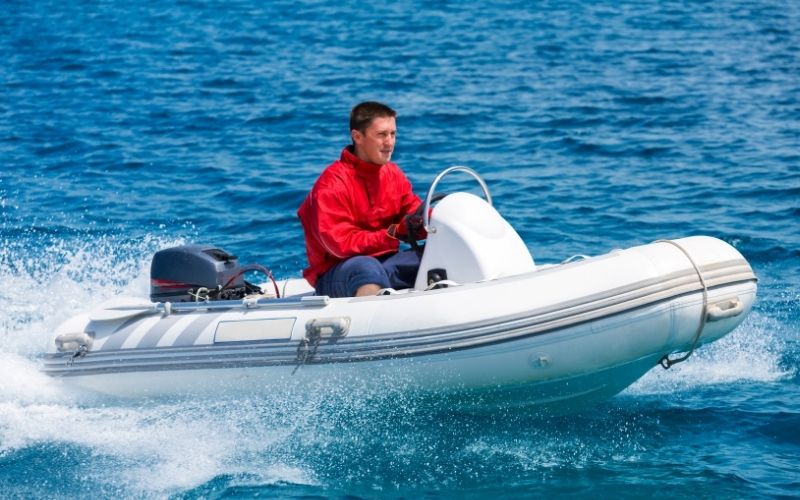So you’re thinking of buying yourself a RIB, or rigid inflatable boat. You’ve heard lots of great things about them–they’re fuel-efficient, fast, and highly dependable.
But you have one concern: are they safe?
How safe can it possibly be to hit the water in a vessel floating on inflatable tubes? Couldn’t the tubes puncture too easily?
Can a RIB boat sink, flip, or otherwise capsize on the water?
And even if we can determine that RIB boats are fairly safe, how long can you expect yours to last?
These are all valid questions. In this article, we’ll explore the answers to each of them.
Ready to dive in?
Table of Contents
Can a RIB Boat Sink?
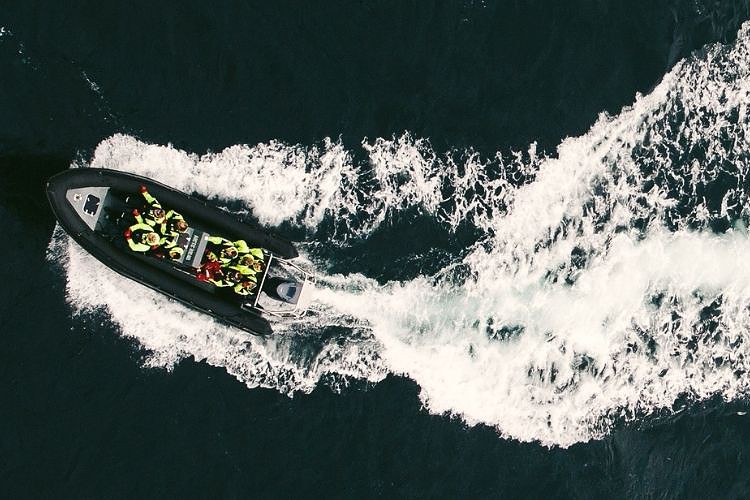
We should preface this section by stating upfront: no boat is truly unsinkable.
With that in mind, yes, it is possible for a rigid inflatable boat to sink. The good news is, RIBs don’t sink very easily. They have to be under an incredible amount of stress.
The most common reason a RIB may sink is that it’s been overloaded with gear and passengers. RIBs are lightweight boats, and while they can hold a lot, they do have weight limits.
It is extremely important to pay attention to the maximum weight limit of any boat you take out on the water. Never exceed this maximum limit, and try to stay well below it. In fact, if you see a posting for the recommended weight limit, let that be your guide.
Your RIB may also sink if it becomes mostly or fully deflated. Most RIBs have separate inflatable chambers so that, if one deflates, the others will stay inflated and keep you afloat. If all the chambers fail at once, this is likely due to misuse or a bad accident on the water.
To avoid jeopardizing your inflatable boat’s air chambers, avoid craggy areas, reefs, and rocky shorelines and rivers. Take care of your boat in between uses, and make sure to store it out of direct sunlight and protect it from storms and temperature extremes.
Can a RIB Boat Flip Over?
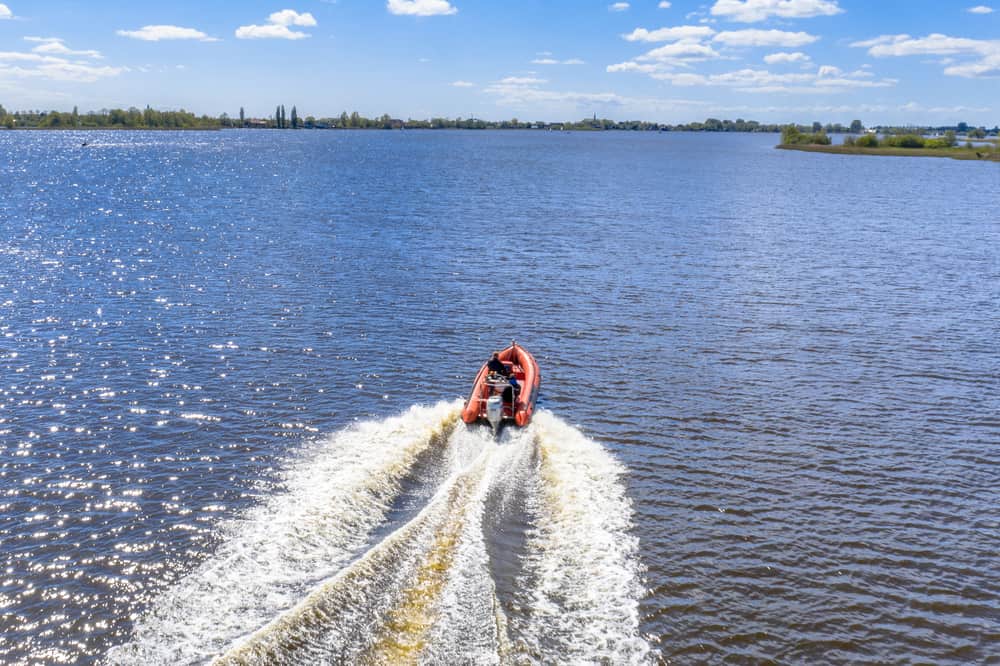
RIB boats are exceptionally lightweight, which makes them highly fuel-efficient and speedy. But it does make them more prone to flipping over, especially in rough waters.
That said, RIB boat manufacturers are aware of this tendency, and great improvements have been made in the overall design of these boats. Today, they are specifically designed with a wide base and added weight, both of which help them stay upright in the water.
RIB boats are most likely to flip if the boat is unevenly loaded. Before hitting the water, make sure to spread your gear and any passengers evenly throughout the boat. Again, paying attention to weight limits is also important.
Excessively high waves may also cause your RIB to flip. It’s important to consider what your boat is capable of handling. For example, you wouldn’t want to take a small, inexpensive RIB out in the ocean when a tropical storm is moving in.
Pay attention to the weather anytime you’re planning to hit the water in your RIB, even if you’re only going to be on a small lake. It’s always best to know what you’re getting into ahead of time rather than getting caught off guard while you’re on the water.
Also, use caution, especially if there is a threat of lightning or damaging winds. It’s always better to be safe than sorry.
Can RIB Boats Puncture?
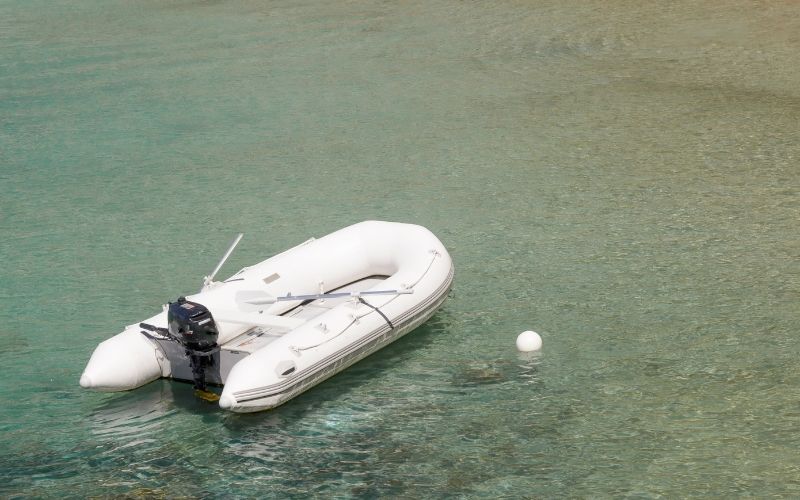
If you’re considering a RIB for the first time, your biggest concern may be the material used to make the inflatable tubes or sponsons. After all, these are what keep the boat afloat. If they should fail, you could find yourself sinking pretty quickly.
Fortunately, technologies are improving to make RIB boats more and more puncture-resistant. Today, RIBs are often made of durable Hypalon materials that can’t be easily punctured. Some are even made of PVC-coated fabric that is virtually indestructible.
As mentioned above, nearly every modern RIB boat has several separate air chambers. If one chamber is punctured and deflates, the other chambers will keep the boat from sinking. This safety measure ensures the RIB will stay afloat even if one of the sponsons is punctured.
Of course, the best way to keep your boat from getting punctured is to stay away from areas with sharp things. Avoid jagged surfaces, areas with craggy coastlines, or tight spaces where your boat might rub up against sharp objects.
It’s best to keep your RIB in open, deep waters where the threat of encountering seen or unseen obstacles is at a minimum.
Are RIB Boats Safe?
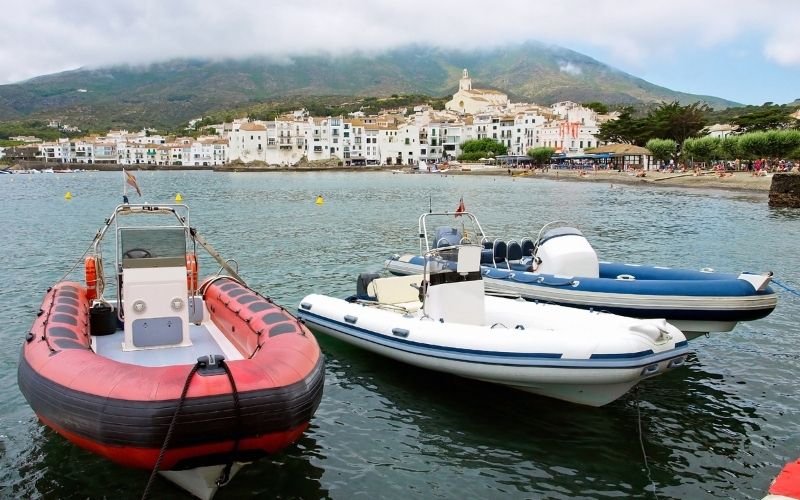
Considering all of the safety concerns and considerations outlined above, you may be wondering, are RIB boats safe enough for personal use? Are they worth the potential risks involved with using them?
As noted above, every type of boat has its own set of risks. If you were to compare a well-made, well-cared-for RIB to any other type of boat, you would find that the RIB is comparatively safe.
Despite the small risks of flipping, capsizing, and sustaining punctures, RIBs are very safe for several reasons.
- They are exceptionally buoyant. Due to their lightweight and inflatable design, RIBs are some of the most buoyant small boats available. Their buoyancy makes them extremely difficult to sink even when they’re under a lot of stress.
- Material quality. Of course, having durable sponsons is of utmost importance to avoid the risk of puncture. The materials used to create the sponsons are continually being improved to make them even more durable, and some are nearly indestructible.
- Stability. The wide base and shock-absorbing qualities of most RIB boats give them excellent stability. They are built to glide through the water at high rates of speed without tipping.
Keep in mind, though, that it is important to follow safety guidelines. When you buy a RIB, be sure you know ahead of time what it’s capable of, and never try to do more with it than what it’s rated for.
It’s also a good idea to remember that you get what you pay for. RIB boats generally cost quite a bit, both upfront and in maintenance. If you go with a cheaper RIB in an effort to save a few bucks, you will probably end up with a more dangerous boat that won’t last as long.
This leads to another question:
How Long Do RIB Boats Last?
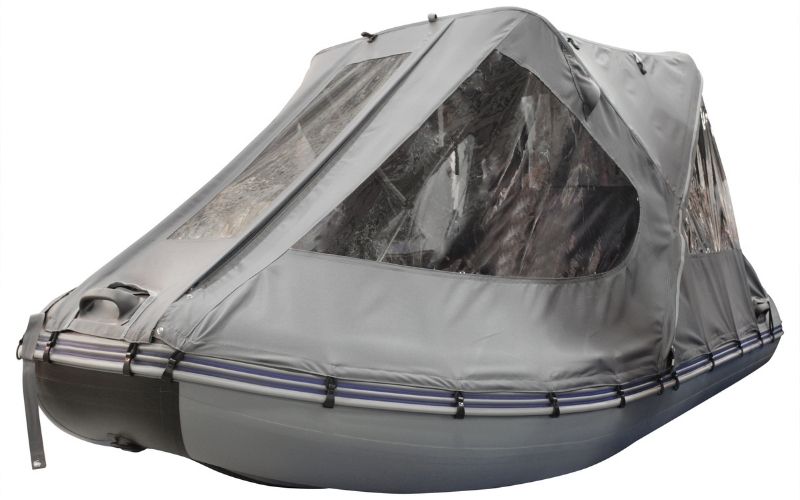
A high-quality RIB boat that is well maintained should last for at least 10 years, and many will last much longer. That said, even the best RIB boats won’t last as long as they should if they are not taken care of.
RIBs are tough little boats, but the inflatable sponsons are prone to UV and weather damage if left unprotected all the time. RIBs should be stored in a climate-controlled garage as much as possible, away from direct sunlight and extreme temperatures.
If you can’t keep your RIB inside, then you’ll need to invest in a quality sun-cover to protect it from UV damage. You may want to deflate the boat and pack it away during the cold winter months.
Another consideration is that not all RIB boats are created equal. Some are made of nearly indestructible materials and are used for military and emergency response purposes, while others are only large enough for one or two passengers and made of lesser materials.
Smaller, cheaper RIBs won’t last as long as expensive tactical ones, no matter how well you take care of them. That is another reason why it’s important to do your research before buying a RIB–you don’t want to waste your money on one that isn’t going to meet your needs.
The cost is the main drawback of a RIB. If you want one that’s going to last, you have to be willing to pay some money for it, and then to keep it properly maintained so it lives up to its potential.
Conclusion
Rigid inflatable boats can be very safe as long as they are used properly. Do not overload them, and make sure all gear and passengers are spread evenly throughout the boat. Pay attention to the weather before heading out. Try to avoid storms, high winds, and areas with sharp rocks.
It’s also important to take care of the RIB when you’re not out on the water. Keep it in a climate-controlled garage, or shade it with a sun cover. Do not allow it to be repeatedly exposed to UV radiation or temperature extremes.
If you take care of your RIB boat, it will take care of you.

Sarah Hood has been writing for Anchor Travel since 2021. When she’s not writing, she enjoys cooking, singing, and spending time in the great outdoors.

